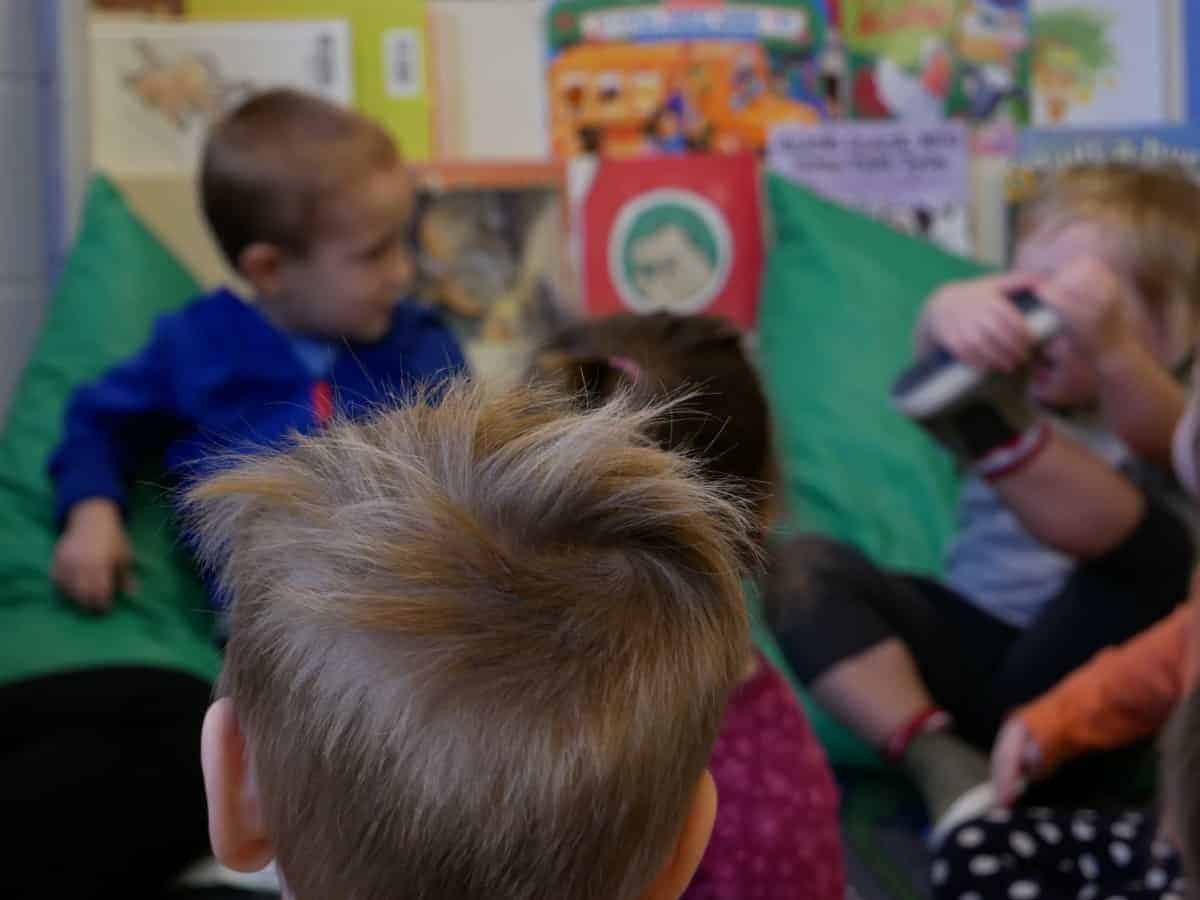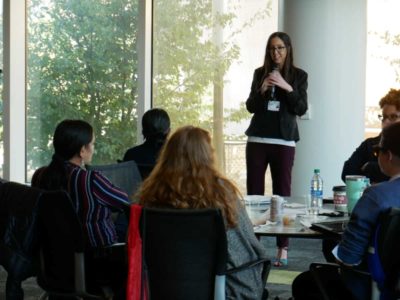
Universal public pre-K programs — programs with no requirement other than age — make a bigger difference in students’ academic success than programs that target specific children with high needs, a Dartmouth College study has found.
And the gains of universal programs are particularly higher for children from low-income families than those from targeted programs like North Carolina’s NC Pre-K.
Elizabeth Cascio, an associate professor of economics at Dartmouth, shared her study’s findings Monday at the Duke Sanford School of Public Policy as part of an early-learning lecture series. Her research shows that universal programs across states do not cost more per pupil than targeted programs, but they deliver “more bang for your buck,” she said. She also discussed some possible reasons.
“In the context of pre-K, one thing that could be happening are human capital spillovers within classrooms,” Cascio said. She said the socioeconomic diversity in a universal classroom may mean benefits for all children like more accountability from middle-class parents and higher quality.
But as far as her research goes, Cascio said she could only control for certain factors and could not say exactly why universal programs came out on top. The factors she could rule out as causes were different aspects of the programs, differences in the environments children would have been in if not in pre-K, and differences in state demographics.
NC Pre-K, which was not included in Cascio’s study because of its late registration cut-off date, is targeted to reach “at-risk” 4-year-olds, who are defined mainly by family income level. Other factors also are considered, such as parent military status, developmental disability, limited English proficiency, educational need or chronic health condition.
A 2018 National Institute of Early Education Research (NIEER) study found that 52% of the state’s 4-year-olds, about 62,000 children, met those eligibility requirements, but that about 53% of those eligible children were not being served. The same study found that such barriers as space, rising operating costs for providers, and stagnant state reimbursement rates caused many counties to turn down state funding for more slots.
“The number of children eligible for NC Pre-K but unserved far exceeds: the number of children on ‘waiting lists,’ the availability of funded ‘slots’ within the program,” and “the current capacity to serve additional eligible children,” the report reads.
Research from the Frank Porter Graham Institute at the University of North Carolina at Chapel Hill has measured NC Pre-K’s quality and effectiveness since its inception in 2001 and found significant impacts on students’ kindergarten readiness and academic and social outcomes. Kristi Snuggs, director of the state Division of Child Development and Early Education, said the idea behind using a targeted program was to reach the children who needed services the most with little resources.
“It had bipartisan support in the legislature,” Snuggs said. “By having that, and having the limited resources, and being able to address the most at-risk and needy children across the state to really zero in on that achievement gap, I think are the main reasons why we went with a targeted program.”
For now, Snuggs said, the state’s focus is on expanding the current program to reach eligible children. She said her team is constantly looking at barriers to expansion and surveying NC Pre-K participants and providers, and those who choose not to use available slots. A constant issue her team hears, Snuggs said, is that the rate the state pays providers to serve NC Pre-K children has not been increased since 2011. The operating costs, on the other hand, have increased over the last decade.
“Those limited resources that the state has to contribute to this is a big factor in how we can expand the current program and also … one of the reasons why universal pre-K has probably not been considered as widely as it might have been had their been more resources,” Snuggs said.
When it comes to statewide universal pre-K, one concern of early childhood advocates is how the public program would interact with the state’s current mixed delivery system. A mixed delivery system means that sources of funding are often braided together to serve students. In one classroom, one student might be paid for privately, while another student is funded through Title 1 federal funds, while another is funded through NC Pre-K. Snuggs said about half of NC Pre-K slots are in private centers and half are in public elementary schools.
Since serving infants and toddlers is so much more expensive, those private providers often subsidize the costs of infant and toddler care with fees paid by the preschool-age children. If the state switched to entirely public pre-K and the preschool-age students left, that would mean many of those private providers may not have funds for serving infants and toddlers. Mandy Ableidinger, NC Early Childhood Foundation’s policy and practice leader, said in an email that a system that maintained that public-private partnership would be important.
“So if we DID go with universal preschool, we’d need to do it in a way that maintained our public/private partnership system (i.e., government subsidies to parents to choose their children’s early care center rather than stand-alone government-funded PreK centers) or we might end up seeing an unintended consequence of losing infant/toddler slots because private providers wouldn’t be able to keep those classrooms open. And there already aren’t enough to meet the need,” she wrote.
Durham expands to universal
Though universal pre-K does not seem to be a probable statewide option for the near future, local communities across the state are taking the idea into their own hands. Durham County, Mecklenburg County, and Forsyth County are among localities either studying, planning, or starting universal pre-K systems.
Linda Chappel, senior vice president of the Triangle Area Child Care Resource & Referral Services, who is managing the Durham Pre-K expansion, said this work has been happening for years there. In 2016, local leaders formed a preschool task force to start studying issues of access and equity. One of the group’s recommendations? Universal pre-K.
With more study of the community’s capacity to build a universal system, leaders found some troubling issues of access. For every six low-income children in Durham County, there was one publicly funded pre-K spot. Chappel said the universal approach appealed to the county for multiple reasons. Family income, she said, does not always show the full picture.
“We know that children, they don’t come with labels,” she said. “Children don’t have a label that says, ‘I need pre-K,’ or ‘This child needs pre-K vs. that child.’ We know that most publicly funded programs use family income as a proxy for need, but we also know that many other children and family factors shape children’s development and the risks for children struggling in school.”
Looking long-term, Chappel said, local leaders could see from looking at universal kindergarten that the model changed families’ expectations of their children’s abilities.
“As we’ve seen over the years when kindergarten became an expectation, it really shapes parents’ perceptions of their young children as learners and how families interact with their children and what their role is in supporting learning.”
Over the last three years, the county has made a $10 million investment to make pre-K universally available. Chappel said that this year there were 602 pre-K seats supported by local funds. The county’s approach is to continue braiding multiple sources of funding and add local funds when necessary.
The program still has some aspects of a targeted one — the priority is to reach the neediest children. Families whose income is at or below 300% of the poverty line do not pay at all. For families who make more than 300%, a sliding scale is in place where they pay a certain percentage of their total income as their income increases.
“You’re making every effort to reach the highest need families and prioritizing them,” Chappel said. “But we know that to shape children’s school and life outcomes, we want them to be exposed to all types of opportunities. We want classrooms that are mixed by income, race, ethnicity, all kinds of factors, that contribute to growing community.”
Similarly to the original aim of NC Pre-K, Chappel said Durham sees an opportunity to close academic gaps in high-poverty schools and accelerate school readiness in early elementary school.
“When we studied all the different programs, we felt like the universal preschool model could drive changes in school practices, so in kindergarten, in elementary,” she said. “Kindergarten teachers right now spend some time trying to differentiate instruction to bring children forward to a readiness level. We want teachers to be able to change their focus and practices to accelerate children’s elementary learning while staying in a play-based approach.”
Chappel said teacher quality is a focus of the program. All of the program and teacher education levels of NC Pre-K are in place, plus some additional Durham Pre-K standards. For example, a Durham Pre-K lead teacher must have a birth-to-kindergarten license. Providers who use Durham Pre-K funds must also pay lead teachers a salary comparable to that of public elementary school teachers.
“Our theory of change is that if you invest in teachers, if you have a high-quality teacher, that is where you are going to drive gains in the children,” she said.
The expansion to universal is a process, Chappel said. They are learning as they go and building capacity as they go. Some barriers in access they have found are transportation, before and after-school care for working parents, and distance.
“It’s a growing program where we want there to be no wrong door, strong outreach in the community. We are trying to build public will for the long term so that we assure that there’s continuing strong support for high quality.”


